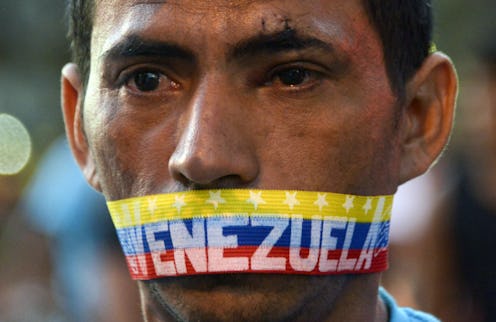News
Obama Declared Venezuela A Threat to U.S. Security
As living and working conditions worsen for citizens of Venezuela, President Obama has issued stronger U.S. sanctions against seven Venezuelan officials, calling on the country's government to release all political prisoners. The President signed an Executive Order on Monday that authorizes the U.S. Department of the Treasury to target "any person determined to be a current or former official of the Government of Venezuela." The Executive Order also authorizes the Treasury Department to target any person who has led any organization in line with the actions of the government that the White House says are violations of human rights.
In a press release on the Venezuela Executive Order, the White House Press Secretary said:
We are committed to advancing respect for human rights, safeguarding democratic institutions, and protecting the U.S. financial system from the illicit financial flows from public corruption in Venezuela.
The new order is intended to stop waves of political corruption that have taken over the Venezuelan government, curbing civilians' freedom of expression and undermining democracy. In recent months, citizens have protested limits on freedom of speech and the crippling goods shortages partially caused by hoarding. Students began protesting nationwide in February 2014. On Feb. 12, 2014, the protests first drew international attention when three people were shot dead.
This winter, the protests have only continued, and so have the deadly use of force police utilize against protesters. On Feb. 24, a 14-year-old student was killed by a policeman while protesting in San Cristobal, Venezuela.
The people of Venezuela are facing a large-scale economic crisis. The national currency, the bolivar, has declined 97 percent in the last three years, making the bolivar worth almost nothing in U.S. cents. Even more shocking and dismaying, the national monthly minimum wage amounts to only $20 USD, not nearly enough to feed a family.
As food lines grow long at grocery stores — so long that people have their hands stamped to save a place on line — President Nicolas Maduro is implementing fingerprint scanners at seven major supermarket chains. In a statement on his website, Maduro said:
We will establish 20,000 fingerprint readers throughout the socialist system to guarantee the people their food. And also (there) has been a meeting today with the seven major private channels and all voluntarily join the establishment of the secure supply system.
Goods shortages in Venezuela aren't only affecting people's food, but other basic needs as well. A box of 36 condoms costs the equivalent of $750, while a box of tampons costs about $17, compared with $7 in New York City. People stand on long lines just to buy toilet paper.
Between the government's failure to deal with these devastating shortages and the country's repeated steps to antagonize the U.S., it's no surprise that Obama has declared a national emergency regarding America's relationship with Venezuela. This month, the Venezuelan government demanded that the U.S. reduce their Embassy staff in that country from 100 personnel to 17 within 15 days. And in February, the government detained four American missionaries from North Dakota to question them for several days before freeing them.
With these new sanctions, President Obama is invoking his Emergency Powers. The Executive Order cites a list of offenses as a prelude to the sanctions themselves:
...erosion of human rights guarantees, persecution of political opponents, curtailment of press freedoms, use of violence and human rights violations and abuses in response to antigovernment protests, and arbitrary arrest and detention of antigovernment protestors, as well as the exacerbating presence of significant public corruption...
In the Order, Obama writes that because of these factors, "the situation in Venezuela ... constitutes an unusual and extraordinary threat to the national security and foreign policy of the United States, and I hereby declare a national emergency to deal with that threat." The Order places specific responsibility on the Bolivarian National Guard (GNB), which Obama writes "used force against peaceful protestors and journalists, including severe physical violence, sexual assault, and firearms" in several cities throughout the country.
The seven officials sanctioned are as follows:
- Antonio José Benavides Torres, commander in Venezuela’s Bolivarian National Armed Forces and former GNB operations.
- Gustavo Enrique González López, director general for the Bolivarian National Intelligence Service.
- Justo José Noguera Pietri, former GNB commander.
- Manuel Gregorio Bernal Martínez, chief of the 31st Armored Brigade of Caracas of Venezuela’s Bolivarian Army and former director general of national intelligence services.
- Katherine Nayarith Haringhton Padrón, a lawyer who prosecuted protesters on unfounded claims of a coup by the U.S.
- Miguel Alcides Vivas Landino, inspector general of the Bolivarian National Armed Forces.
- Manuel Eduardo Pérez Urdaneta, director of the Bolivarian National Police, accused of human rights violations.
Images: Getty Images
